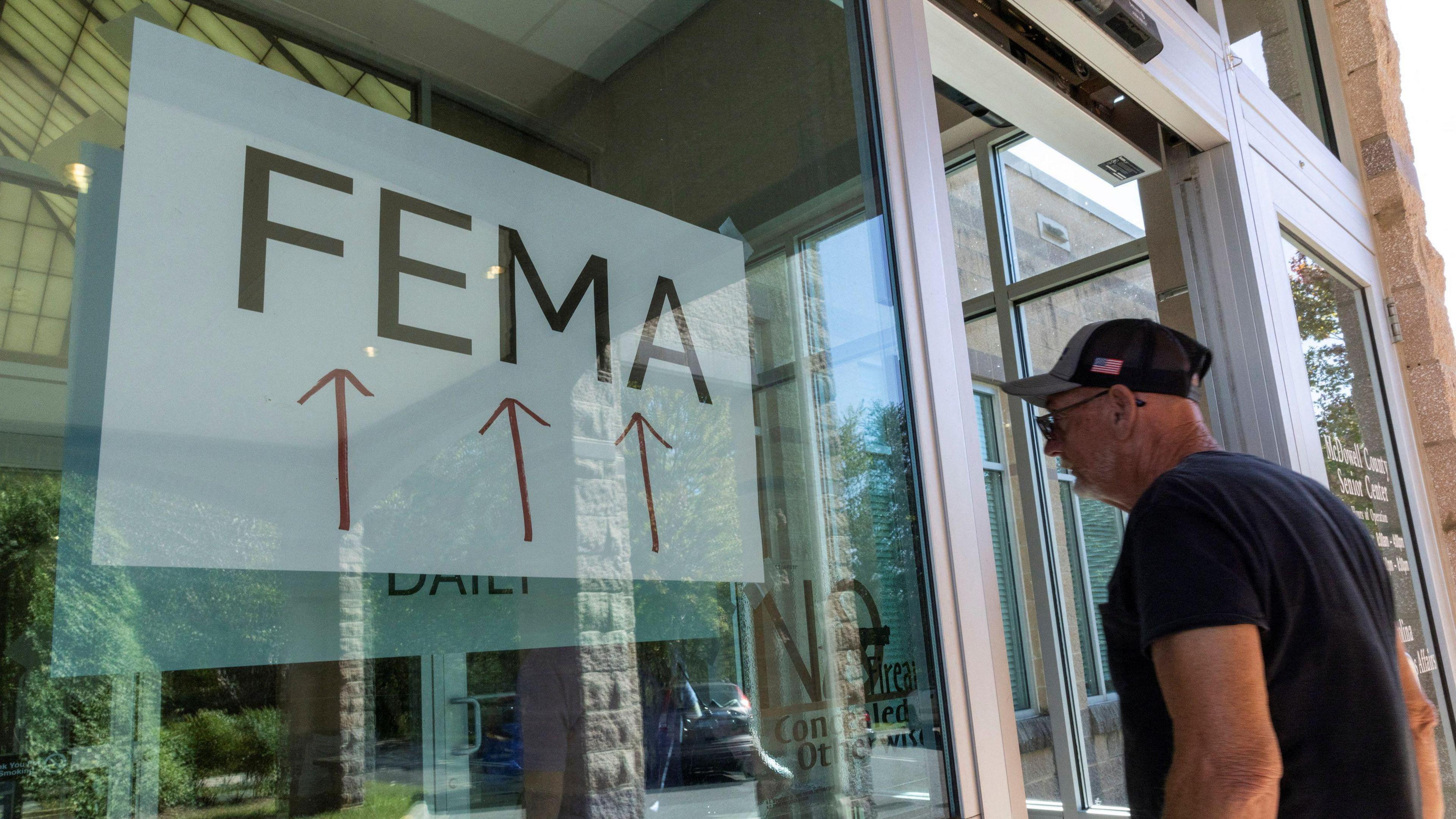Hurricane recovery disrupted by threats to relief workers

A man enters a Federal Emergency Management Agency station in North Carolina
- Published
Threats against aid workers fuelled by misinformation continue to affect hurricane recovery efforts in North Carolina, with workers briefly pulling out of one county over the weekend.
In order to keep staff safe, the US Federal Emergency Management Agency (Fema) has made some changes to how it is operating in the state, it said in a statement.
On Saturday, police in Rutherford County arrested a man who allegedly spoke publicly about harming relief workers and was found with a rifle and a handgun.
Meanwhile, a sheriff in Ashe County, about 100 miles (160km) to the south, said Fema workers briefly paused their work to assess threats they were facing.
Federal workers helping North Carolina recover from Hurricane Helene have had to confront rising distrust from local residents. False conspiracy theories - many of them politically motivated - about land confiscation, cursory aid payments and deliberate weather manipulation have rapidly spread.
Reports indicate that several extremist groups are active in the area, attempting to capitalise on the disaster and the rumours.
Nearly 100 people died from the storm, according to state authorities, and an unknown number are still missing in the mostly rural region, which includes the city of Asheville.
Sheriffs in Rutherford County responded to reports of what they called “credible threats” against relief workers and arrested a suspect, William Jacob Parsons, during a traffic stop on Saturday.
Mr Parsons allegedly made the threats at a local store, according to Rutherford County Sheriff's Office Lieutenant Joseph McComas, who led the investigation
Authorities seized guns, marijuana and drug paraphernalia, Lt McComas said.
Mr Parsons was charged with “going armed to the terror of the people,” a crime under state law punishable by a maximum of 120 days in jail, with bail set at $10,000, authorities said.
Mr Parsons' Facebook profile included dozens of posts about Covid, vaccine and voting conspiracies, along with several posts which included the logo of the anti-government militia movement the Three Percenters.
In an email to the BBC, Mr Parsons said that he is not a member of any militia and called the US government a “terrorist organization” that has “been Violating our Constitutional Rights for way (too) long”.
He denied threatening federal officials and said he was “supporting the victims and helping with loading and unloading of Water, Food, clothing and other necessities for the victims of the horrendous storm.”
Lt McComas told the BBC that a single individual was behind the threats directed at aid workers in the county.
Fema officials working locally were advised to move to a secure location, but returned to their usual assignments on Sunday.
There were initial reports that a "truck load of militia" were involved with the threats, but the sheriff's office said it determined Mr Parsons acted alone.
The North Carolina National Guard said on Monday that it is looking into a report that its troops encountered armed militia groups in the county, a story first reported by the Washington Post, citing an internal email.
No, Hurricane Milton was not 'engineered'
- Published10 October 2024
Influencers risking death in hurricanes for clicks and cash
- Published12 October 2024
Biden condemns misinformation about hurricane
- Published9 October 2024
How hurricane conspiracy theories took over social media
- Published10 October 2024
Fema officials working in the region around Ashe County also faced threats, local Sheriff Phil Howell said on Sunday morning in a Facebook post.
“Out of an abundance of caution, they have paused their process as they are assessing the threats," he wrote.
The village of Chimney Rock in Rutherford County has become the focus of some of the most viral conspiracy theories about land seizures and weather manipulation, also called geo-engineering.
The rumours grew so widespread that Chuck Edwards, the Republican congressman representing the area, issued a statement last week declaring: “Hurricane Helene was NOT geo-engineered by the government to seize and access lithium deposits in Chimney Rock.”
Fema did not comment on specific reports of threats but stressed that disaster recovery centres would remain open and the agency "will continue to help the people of North Carolina with their recovery".
“For the safety of our dedicated staff and the disaster survivors we are helping, Fema has made some operational adjustments,” it said in a statement.
In some cases, the BBC has learned, Fema teams are working at fixed locations instead of going door to door to help survivors.
Correction 16 November: An earlier version of this article referred to a lithium mine in Chimney Rock. Contrary to online speculation, there is no lithium mine in Rutherford County. The reference has been deleted.